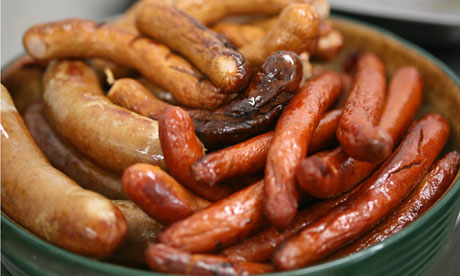
Sausages have never been known as the healthiest food. But what makes them so dangerous?
The things that are causing all the fuss are chemicals called nitrites and nitrates, which once in the body can be converted into cancer-causing compounds. These, according to a spokesman for Cancer Research UK, occur naturally in red meat, but are also often added during meat-processing as a preservative.
All red meat also contains a red pigment called haems, which, once in the gut, can be broken down to form N-nitroso compounds, or NOCs, many of which are known to cause cancer. Additionally, haems may irritate or damage the cells lining the bowel, which can lead to them dividing more rapidly – exactly the kind of action that is more likely to increase the risk of developing cancer.
That doesn't sound good. Any more bad news on this?
The combination of the two, as well as sausages' relatively high fat and salt content, which have also been linked to increased risks of developing cancer, has led to the advice to cut down on both processed and red meat.
I've heard stories of terrible things ending up in a sausage. Can I spend my way out of trouble by buying sausages with a high meat content?
As Cancer Research observes: "It's not about low-quality or low-grade meat in this instance, it's about the meat itself, and what's been added – we know too much salt has been linked to an increased risk in stomach cancer for example."
Although a high meat content is often an indicator of a better-quality sausage (look for sausages that are at least 70% meat), it also means that there will be less of the other ingredients that can reduce the fat content of meat, such as cereals, or the fruit and vegetables often added to modern sausages for flavour (such as leek or apple). There are many things you can do to limit your risk of cancer, but sadly, buying expensive sausages isn't one of them. Cut down your consumption instead.
Is there anything I can look for on the label that will lead me to a healthy sausage?
Choose fresh sausages for a start, and check the list of ingredients: the fewer the better. In terms of general health, look for sausages with a relatively low saturated fat and salt content – or, even better, poultry sausages.
What if I grill them and poke loads of holes in them to let the fat run out?
The resulting sausage will certainly be better for your cardiovascular health – the NHS recommends grilling, rather than frying sausages – but doing this will have little effect on their carcinogenic properties. (You'll also end up with a dry, tasteless banger: fat is an essential part of the sausage's charm. Better to eat one juicy sausage than two sad, mutilated ones.)
Are fancy continental cured meats such as parma ham, serrano or bresaola also lethal? They look so lean!
They're lean, yes – but they're also red meat, which is the problem here. Salts used in the curing process (sodium nitrate and sodium nitrite) don't help the matter – they have a powerful antibacterial function that prevents harmful microbes, such as the botulism toxin, growing on the meat as it matures, but they have also been linked with an increased risk of cancer.
If the chemicals are the problem, then is cured fish just as dangerous?
Cancer Research UK says that there isn't, at the moment, any convincing evidence to show that eating fish or chicken, smoked or unsmoked, increases your risk of cancer. If you do eat a lot of red or processed meat, however, there is some evidence that cutting down by eating other things instead, such fish, poultry, beans and lentils can be beneficial. So tuck into that smoked salmon with gusto.

